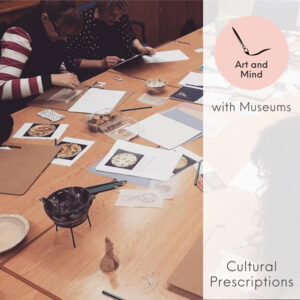Wellbeing Programming: Museums of the University of St Andrews

The project
Our online wellbeing programme began with Museum Storytime, which encouraged viewers to take 10 minutes to listen to a story about an object in the museums’ collections, or a person connected to them. As the months went on, and with the beginning of the new academic year, our programming became even more focused on supporting student wellbeing.
This led to us designing and badging each of our events with at least one of the Five Ways to Wellbeing – Connect, Learn, Be Active, Take Notice, and Give. By promoting the programmes alongside the Five Ways to Wellbeing, audiences know how each event can contribute to their wellbeing.
Over the course of the pandemic, we have launched:
- Who Am I? Who Will I Be? – a series run in conjunction with the student Art Society, which explored themes of identity expressed through art.
- Take Notice – a series of one-minute videos introducing a short wellbeing activity.
- Headspace – a series for students during revision and exam periods, utilising our digital storytelling tool Exhibit which encourages audiences to look closely and mindfully at a work of art, in conjunction with the Students’ Association.
- And more recently, Get Outdoors – an outdoor wellbeing activity that encourages audiences to look closely at a piece of art, and then to ‘get outdoors’ and play an I-Spy activity.
As a result of the success of the online wellbeing programme, we developed Take Notice into a mindfulness resource booklet development with contributions from the University Cultural Partners (Libraries, Music Centre and Byre Theatre). It brought together the wealth of cultural resources in the St Andrews community to develop short mindfulness activities for Fresher’s Week – which could be done at home, out and about, or in the cultural venues when we were able to accommodate visitors again.
A Cultural Prescription pilot project for students has also been developed, which will bring the Cultural Partners together again, to offer sessions designed to support student wellbeing, signposted by Student Services. This will help to fill a gap in cultural wellbeing provision in the University, especially at a time when student support services are under pressure.
"During a global pandemic where students have been facing unprecedented challenges for their wellbeing during their studies, the work of the Museums team has been timely, innovative and thoroughly befitting to our University's whole-community approach to the mental wellbeing of students and staff. The spirit of collaborative working and ambition of a programme such as Cultural Prescriptions will likely inform exciting work to come in the future for the benefit of student wellbeing, creativity and connection."
Dr Adam Welstead, Assistant Director (Counselling), Student services, University of St Andrews
Challenges and successses
- One of the main challenges we have faced has been to ensure that meaningful interactions which contribute to peoples’ wellbeing could happen in an online context.
- What we feel has made this programme successful is designing sessions and events with the online platform in mind, rather than attempting to fit any existing on-site ideas into an online format. This has allowed us to be experimental in our approach and develop new and innovative ways of programming.
- Our Exhibit tool has greatly contributed to this approach. Utilising Exhibit has allowed us to develop a new, mindful viewing process for our collections – guiding viewers through a work of art and employing mindfulness techniques to encourage them to engage in a more meaningful and sustained way with the object than if they had just seen the image on our social media channels, or even in the museum space.
The impact it has made
- The main impact the programmes have made are to contribute to the wellbeing of our audiences during the pandemic, but particularly students.
- Student Services at the University signpost students to the Take Notice resource and have supported us in our development of the Cultural Prescription pilot programme.
Lessons learned
- The honing of our digital skills – including video and audio editing, which we have gotten quicker at as the year has gone on!
- We are undertaking further evaluation of the wellbeing programme, and the Cultural Prescription pilot project, which we hope to publish as a case study for the sector.
Guidance
- Consultation with key partners has been incredibly important in the development of all of these programmes and projects.
- Design the programme for the platform rather than trying to fit something online that would be better in person.
Further information
If you would like more information about this project please contact Eilidh Lawrence, Assistant Learning and Access Curator at the Museums of the University of St Andrews, email: erml@st-andrews.ac.uk